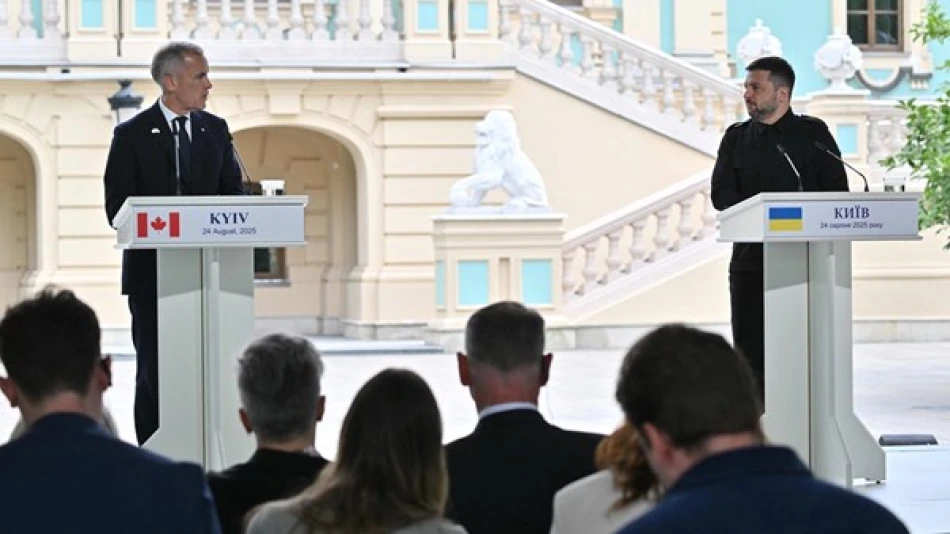
Zelensky Addresses Potential Deployment of Ally Forces in Ukraine
Ukraine Pushes for Allied Troops Deployment as Security Guarantee Strategy Takes Shape
Ukrainian President Volodymyr Zelensky has signaled that deploying allied forces on Ukrainian soil after the current conflict ends would be "important" for the country's long-term security, marking a significant shift in Kyiv's post-war planning strategy. The statement, made during Canadian Prime Minister Mark Carney's visit to Kyiv on Ukraine's Independence Day, underscores Ukraine's growing emphasis on securing tangible military guarantees rather than relying solely on diplomatic assurances.
The Security Guarantee Dilemma
Zelensky's comments reflect Ukraine's painful lesson from the 2014 Crimean annexation, when the Budapest Memorandum's security assurances proved insufficient against Russian aggression. Unlike the vague commitments of 1994, Ukraine now seeks concrete military presence as a deterrent mechanism.
"The issue of having (forces) on the ground is important for us," Zelensky stated during the joint press conference, indicating that symbolic support is no longer adequate for a country that has endured over two years of full-scale invasion.
Canada's Diplomatic Balancing Act
Prime Minister Carney's visit carries particular weight given Canada's historical role as a mediator in international conflicts. His call for a ceasefire while simultaneously supporting Ukraine's right to determine its own security arrangements reflects the complex diplomatic choreography required in any future peace negotiations.
Carney emphasized that "Russia has no right to decide how Ukraine's sovereignty, independence, and freedom will be guaranteed in the future. This is Ukraine's choice and relates to partner decisions."
Historical Precedents and Strategic Implications
The concept of allied troop deployments as security guarantees has precedent in post-conflict scenarios. South Korea's experience with U.S. forces since 1953 demonstrates how permanent military presence can effectively deter aggression, while NATO's Enhanced Forward Presence in the Baltics since 2017 shows how even modest deployments can provide credible deterrence.
The NATO Question Mark
Ukraine's push for ground forces reflects uncertainty about NATO membership timelines. While Article 5 guarantees remain the gold standard for collective defense, the alliance's reluctance to admit Ukraine during active conflict has forced Kyiv to explore alternative security architectures.
This approach mirrors Israel's strategy of maintaining both formal alliance relationships and bilateral security agreements with multiple partners, creating overlapping deterrence layers.
Economic and Military Calculations
From a strategic perspective, allied troop presence would serve multiple functions beyond deterrence. It would facilitate ongoing military modernization, ensure interoperability with Western systems, and create economic incentives for continued international investment in Ukraine's reconstruction.
However, the financial burden of maintaining foreign forces could strain both Ukraine's budget and allied resources. The U.S. spends approximately $3 billion annually maintaining troops in South Korea, suggesting that any Ukrainian arrangement would require substantial long-term commitments.
Regional Response and Russian Calculations
Ukraine's security guarantee strategy will likely influence broader regional dynamics. Poland and the Baltic states may view permanent Western presence in Ukraine as enhancing their own security, while neutral countries like Austria might see it as unnecessarily provocative.
For Russia, the prospect of NATO-aligned forces permanently stationed in Ukraine represents a significant strategic setback, potentially influencing Moscow's calculations about conflict duration and acceptable peace terms.
The Timing Factor
Zelensky's public articulation of troop deployment preferences during Independence Day celebrations suggests Ukraine is already shaping post-conflict narratives. This proactive approach contrasts with previous conflicts where security arrangements were hastily negotiated during ceasefire talks, often resulting in inadequate protections.
The Ukrainian strategy appears designed to establish international consensus around robust security guarantees before any formal peace negotiations begin, potentially strengthening Kyiv's bargaining position when diplomatic solutions eventually emerge.
Most Viewed News

 Layla Al Mansoori
Layla Al Mansoori






